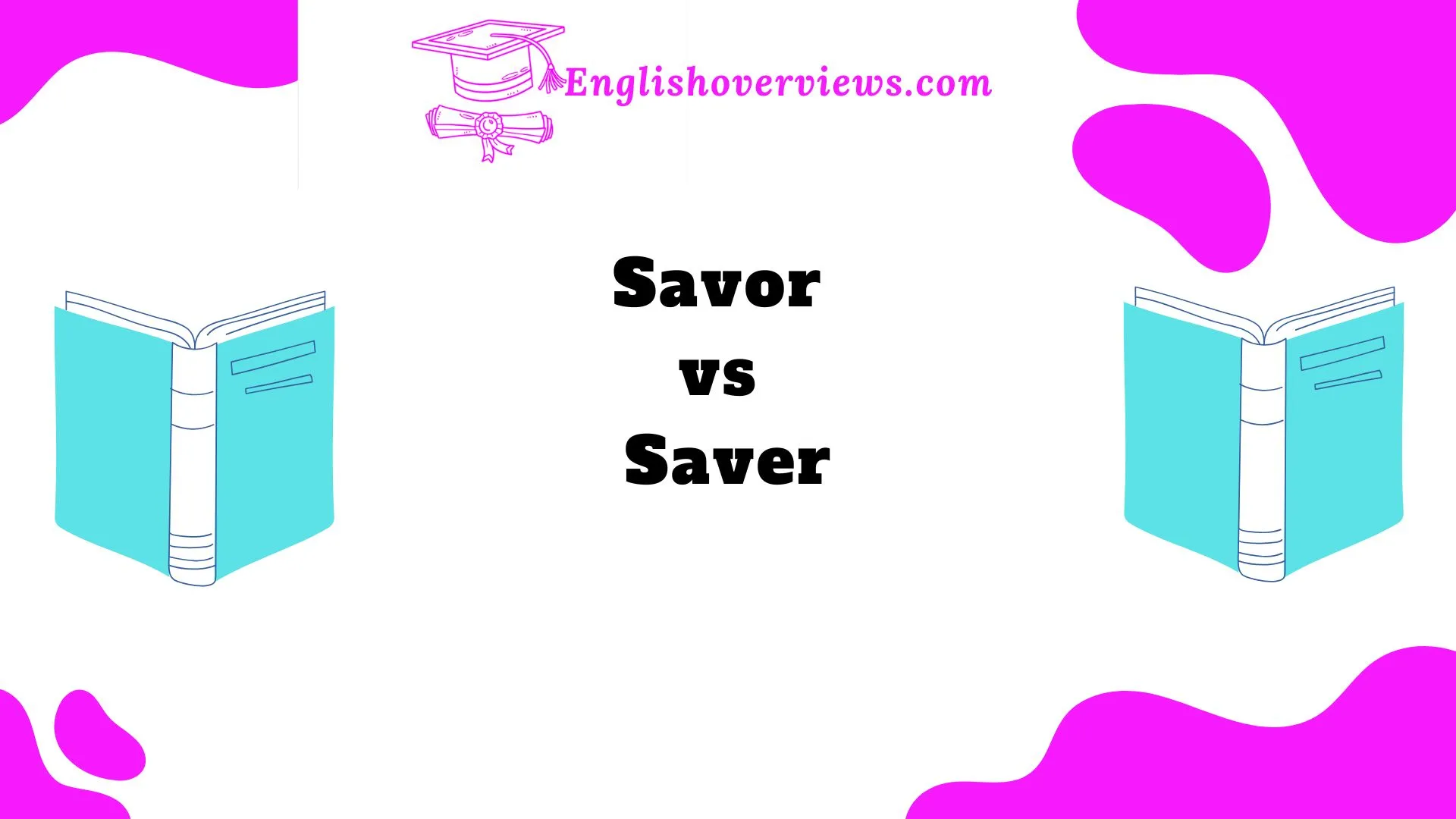Mixing up homophones like savor and saver is something we’ve all done at some point, especially when they sound so alike. But knowing when to use each one can save you from making embarrassing mistakes in your writing or speech.
Whether you’re writing an email, preparing a blog post, or just chatting, it’s essential to use the right word to convey your message clearly.
In this comprehensive guide, we’ll explore the differences between savor and saver, provide real-life examples, and offer tips to help you remember which to use.
By the end, you’ll have a deep understanding of these two commonly confused words, so let’s dive in!
What Are Homophones?
Before we dive into the specifics of savor vs. saver, let’s first define what a homophone is. A homophone is a word that sounds the same as another word but has a different meaning and often a different spelling. Think of it like a pair of twins that look different but are often mistaken for each other.
For example, words like “there,” “their,” and “they’re” are homophones. While these words sound identical, each one has its unique definition and usage.
This is the case with savor and saver too—they sound the same but mean completely different things.
Why Do Homophones Matter?
Homophones are crucial in English because incorrect usage can easily lead to confusion. They can change the meaning of a sentence, and when you’re trying to communicate effectively, you don’t want your audience to misunderstand your message. U
sing the wrong homophone may make you sound unprofessional or careless, so it’s important to get it right.
Now that we understand homophones, let’s look at the two we’re focusing on in this article—savor and saver.
Understanding Savor
What Does ‘Savor’ Mean?
The word savor is a verb that means to enjoy or appreciate something fully, especially when it comes to sensory experiences like taste or smell. You might savor a delicious meal, a moment in time, or even an emotion. It’s all about relishing or lingering in an experience.
Example Sentences:
- “He took a deep breath and savored the aroma of fresh coffee.”
- “Let’s savor the moment before we leave this beautiful place.”
Usage in Context
You’ll typically see savor used when talking about things that bring joy through experience. Often, it relates to food or sensory experiences, but it can also apply to emotional or visual experiences.
- Food & Drink: “She savored every bite of the gourmet meal.”
- Moments: “I want to savor this sunset before it’s gone.”
- Experiences: “He savored the feeling of victory after winning the match.”
Origins and Etymology of ‘Savor’
The word savor comes from the Latin word saporem, which means “taste” or “flavor.” Over time, it evolved to also describe enjoying something in a broader sense, not just related to taste.
Understanding Saver
What Does ‘Saver’ Mean?
On the other hand, saver is a noun that refers to someone or something that saves something. It’s often associated with saving money, energy, or even time. For instance, a saver could be someone who collects coupons or uses energy-efficient devices. Essentially, it’s anyone or anything that preserves or avoids waste.
Example Sentences:
- “As a coupon saver, she managed to cut her grocery bill in half.”
- “Switching to an LED bulb is a great way to be an energy saver.”
Usage in Context
Here, saver is used when talking about a person or device that saves. It could be related to financial savings, environmental savings, or even time-saving tools.
- People: “He’s a natural saver, always thinking of ways to keep his finances in check.”
- Objects: “The new app is a real time saver.”
Origins and Etymology of ‘Saver’
Saver is derived from the verb save, which means “to keep something safe or prevent it from being lost.” The suffix “-er” is added to denote someone or something that performs an action (like a “runner” runs, a “reader” reads).
Savor vs. Saver: Key Differences and Usage
Meaning Differences
The main difference between savor and saver lies in their meanings:
- Savor: To enjoy or appreciate something deeply.
- Saver: A person or thing that saves something (like money, energy, or time).
Here’s a quick comparison table to highlight these differences:
| Word | Meaning | Example Sentence |
| Savor | To enjoy fully, especially in relation to taste or experience. | “I savored every moment of the vacation.” |
| Saver | A person or object that saves something (money, energy, etc.). | “She’s a great saver, always looking for discounts.” |
Spelling and Pronunciation
Both words are pronounced the same way, making them homophones, but their spellings differ. It’s easy to confuse them if you’re not careful, so remember:
- Savor: Think of the “V” as related to vacation—something to enjoy.
- Saver: The “V” is tied to value—something that preserves or protects.
When to Use ‘Savor’ vs. ‘Saver’
Use savor when you’re talking about enjoying something, especially with your senses. On the other hand, use saver when referring to someone or something that saves.
Examples in Context:
- Savor: “Take your time and savor every sip of your tea.”
- Saver: “This new phone charger is a real saver when it comes to fast charging.”
Tips for Remembering the Difference
Sometimes, it’s tricky to keep homophones straight, but here are a few tricks to help you remember the difference between savor and saver:
- For Savor: Think about the “V” in savor as being linked to vacation—a time to relax and enjoy.
- For Saver: The “V” in saver stands for value, which is about saving something of worth.
Common Mistakes to Avoid
Here are a few common mistakes people make when using savor and saver:
- Incorrectly using savor for someone who saves things: “She’s a great savor when it comes to coupons.” This should be saver because she’s saving coupons.
- Using saver to describe enjoyment: “I saver every bite of the cake.” This should be savor because you’re enjoying the experience of eating.
Real-World Case Study: A Marketing Example
In the world of marketing, using the correct homophones is crucial for brand perception. Consider the case of Green Saver, a company that markets eco-friendly products. Using the word “saver” emphasizes their value in saving resources and protecting the environment.
On the other hand, a brand like Savor Chocolates would emphasize indulgence and enjoyment, aligning with the word savor to evoke a sense of pleasure and luxury.
Conclusion
Understanding the difference between savor and saver is essential for clear communication. Savor is all about enjoyment, especially in sensory experiences, while saver refers to someone or something that saves. Knowing when to use each will ensure you sound confident and precise in both written and spoken English.
FAQs About Savor vs. Saver
1. Can I use savor and saver interchangeably?
No, these two words have different meanings. Use savor when talking about enjoying something, and saver when referring to someone or something that saves.
2. What’s the origin of savor?
Savor comes from the Latin word saporem, meaning “taste” or “flavor,” and over time evolved to mean enjoyment of any experience.
3. Are there other homophones that confuse people like savor and saver?
Yes, many homophones exist in English! Some examples include their, there, and they’re, or flour and flower. It’s important to understand their meanings and contexts to avoid errors.

Alyan Ashraf is the creative mind behind English Overviews, a platform dedicated to helping learners master the English language. Passionate about education and language development, Alyan specializes in simplifying complex English concepts, making learning accessible for students of all levels.











